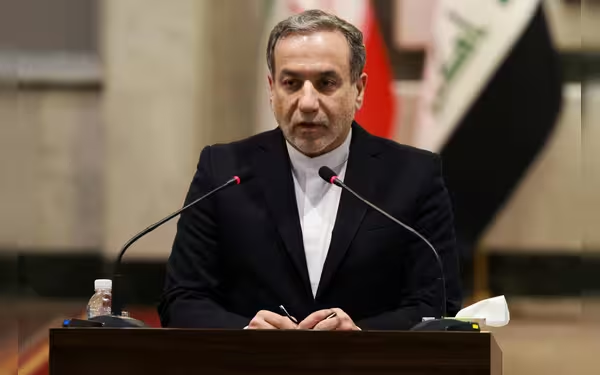Saturday, November 16, 2024 05:58 PM
Iran's Foreign Minister Declares No Red Lines in Defense Strategy
- Iran vows no limits in defending its interests.
- Israel promises deadly retaliation against Iran's missile attack.
- Diplomatic efforts continue amid rising regional tensions.
 Image Credits: arabnewspk
Image Credits: arabnewspkIran's FM Abbas Araghchi states no red lines in defense, amid rising tensions with Israel following missile attacks.
BAGHDAD: In a significant statement that underscores the escalating tensions in the Middle East, Iran's Foreign Minister, Abbas Araghchi, declared on Sunday that there would be "no red lines" for Iran in defending its people and interests. This declaration comes in the wake of Israel's anticipated retaliation following Iran's missile attack, which saw 200 missiles launched at Israel on October 1. Iran justified this action as a response to the killing of leaders aligned with Tehran and a general from Iran's Revolutionary Guards.
Araghchi's remarks were made during his visit to Baghdad, where he engaged in discussions with Iraqi officials regarding the ongoing conflicts in Gaza and Lebanon. He emphasized that despite Iran's efforts to prevent a full-scale war in the region, the country remains resolute in its commitment to protect its sovereignty and citizens. In his words, "While we have made tremendous efforts in recent days to contain an all-out war in our region, I say it clearly that we have no red lines in defending our people and interests." This statement reflects Iran's firm stance amidst rising regional tensions.
Israeli Defense Minister Yoav Gallant has responded to Iran's actions with a promise that Israel's retaliation will be "deadly, precise, and surprising." This statement indicates a potential escalation in military actions, raising concerns about the broader implications for regional stability.
During his visit, Araghchi also met with Ali Al-Moussawi, a political adviser to the Iraqi prime minister, who described the discussions as part of a diplomatic effort aimed at "silencing weapons and violence" to foster security and stability in the region. Following his meetings in Baghdad, Araghchi is set to travel to Oman, as reported by the Iranian ISNA news agency.
Prior to his visit to Iraq, Araghchi was in Qatar, where he met with Prime Minister Sheikh Mohammed bin Abdulrahman Al Thani to discuss the conflicts in Gaza and Lebanon. Qatar has been actively mediating talks aimed at achieving a ceasefire in Gaza and has called for a truce in Lebanon, highlighting its role as a key player in regional diplomacy.
In a recent interview, Araghchi reiterated that Iran does "not want war" but is "not afraid of it," indicating a readiness to respond to any potential threats. He stated, "We will be ready for any scenario," during an interview with Al Jazeera, further emphasizing Iran's preparedness in the face of escalating tensions.
The situation in the Middle East remains precarious, with the potential for conflict looming large. As nations navigate these turbulent waters, the importance of diplomatic dialogue cannot be overstated. The ongoing discussions among regional powers highlight a collective desire for stability, yet the underlying tensions continue to pose significant challenges. It is crucial for all parties involved to seek peaceful resolutions to avoid further escalation and ensure the safety and security of their citizens.













